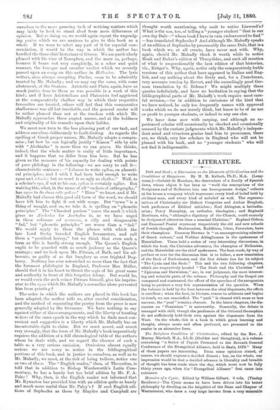CURRENT LITERATURE.
Path and Goal ; a Discussion on fits Elements of Civilisation and the Conditions of Happiness. By M. M. Kalisch, Ph.D., M.A. (Long- mans.)—Gabriel de Mondoza, the descendant of a family of Spanish Jews, whose object it has been to "weld the conceptions of the Scriptures and of Hellenism into one homogeneous design," collects at his house a company which represents every kind of belief held by civilised man, and every kind of unbelief as well. The represen- tatives of Chiistianity are Hubert Gregorius and Arthur Bergholt, both professors of Biblical criticism ; Noel Abington, a latitudin- arian; Percy Humphry, an orthodox theologian ; and Reginald Mortimer, who, "although a dignitary of the Church, could scarcely be designated otherwise than a nominal Christian." Raphael Gideon and Emanuel Panini represent respectively the old and new schools of Jewish thought. Brahmanism, Buddhism, Islam, Parseeism, have their champions. Erasmus Hermes is "an uncompromising admirer of Greek culture," and Walther Altinghatisen is the spokesman of Materialism. These bold a series of very interesting discussions, in which the host, the Christian advocates, the champion of Hellenism, and the Materialist are the chief spokesmen. The host reads, by way.of preface or text for the discussion that is to follow, a new translation of the Book of Ecclesiastes, and the first debate has for its subject "The Cynic and the Stoic." This and the two following chapters, which are respectively headed "The Stoic and the Christian" and "Epicurus and Darwinism," are, in our judgment, the most interest- ing and valuable parts of the volume. Philosophy and the Gospel are compared and contrasted, the effect of the speeches of the antagonists. being to produce a very fair representation of the question. When the balance is held by the host between the rival disputants, the effect is excellent ; when the host, in his tarn, ceases to arbitrate and begins to teach, we are unsatisfied. The "path" is cleared with more or less success; the " goal " remains obscure. In the latter chapters, the dis- cussion on " Pessimism " is noteworthy. Generally, the debate is managed with skill, though the professors of the Oriental theosophies do not sufficiently hold their own against the disputants from the West. On the whole, this is a book in which great learning and thought, always acute and often profound, are presented to the reader in an attractive form.


































 Previous page
Previous page